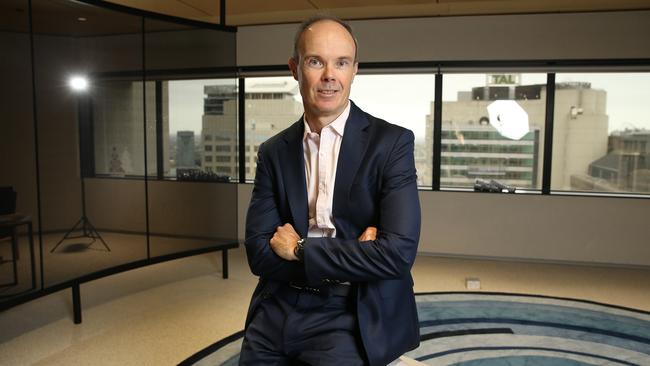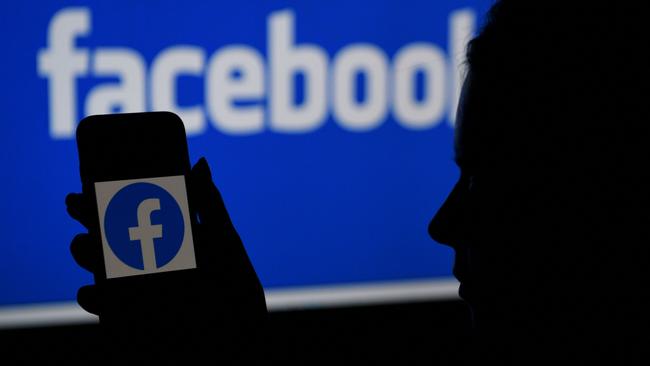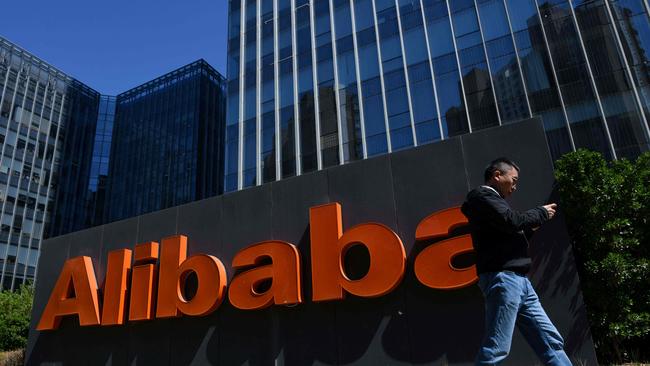Magellan’s Hamish Douglass warns in investor letter that stock markets are priced for ‘zero risk’

He is comfortable with the $114bn fund’s investments in China, and with its exposure to US tech giants staring down regulation.
Mr Douglass spoke to The Australian on the release of his annual letter to investors with a top line message to remain rational, especially when others are gripped by emotion.
There is no market debate around “this time it’s different”. Things are different. Mr Douglass tells his investors the world faces its most complex set of circumstances in 30 years and he makes no call on markets.
“On one side of the equation we have all of us getting our vaccine jabs, a massive government stimulus, economies on fire, strong stock markets. On the other side there are risks hiding in plain sight: cryptocurrencies is one of them and other bubbles in markets; the virus is continuing to mutate in the world and then the other one is risk of inflation,” Mr Douglass told The Australian.
“How do you position yourself and steer through a situation, where you could see a market collapse, or you could see incredibly strong economies and continuation of these bull market scenario? That’s the theme.”
The Magellan Global Fund is a concentrated portfolio of around 25 international companies where Mr Douglass sees sustainable competitive advantage, with holdings in companies like Alphabet, Starbucks and Alibaba.
Central bank and fiscal stimulus have warped classic economic cycles. mR Douglass believes the inflation big bump from spikes in oil prices and car prices will subside as economies fully open up, but he says that is the wrong question to be asking.
“What happens if it is not transitory? And that is where the big risk in markets are. No one knows if it’s going to be transitory to be honest. That’s what the central banks are thinking but there are other issues going on like wages where this could be a new cycle of inflation.”
Magellan missed the November rally last year by being too cautious ahead of the vaccine trial results. after which many cyclical stocks took off. As a result, Magellan Global Fund returns dipped below the MSCI World Index and the investment veteran appropriately devotes a good chunk of the letter as to why the mistake occurred.
In part, says Mr Douglass, it was the fund’s limited risk budget for holding cyclicals like banks and travel companies have high risk ratios for the fund. “In hindsight, if I had my druthers again I would have more likely taken some more risk in that area, within our risk budget,” he said.

That would have meant selling down a Microsoft or Alibaba, and at the time on a three-year view, Magellan had more confidence in those stocks than owning a US bank like Wells Fargo. “It turned out that Wells Fargo doubled the share price in a little over a month and that was one of the ones that we looked at,” Mr Douglass said.
Magellan is in for the long term and will not chase the market after the horse has bolted, he tells investors. The fund’s large institutional shareholders have given it “almost zero pushback” he says, because of the strong performance in adverse markets where it sits in the top 1 per cent of all equity managers.
Since its 2007 inception, Mr Douglass points out that the Magellan Global Fund has delivered a return of 11.9 per cent per annum in local currency terms and after fees, according to figures released by Magellan on Monday.
This is ahead of its 9 per cent objective; and on a three-year rolling basis measured monthly, the fund has delivered an average three-year return of 14.4 per cent, outperforming the MSCI World Index by 4.2 per cent; and in terms of capital loss, it has suffered only 45 per cent of the market’s decline.
Mr Douglass remains confident about the fund’s China investment over the long term with China’s GDP per capita still just a fifth of Australia and the US.
Investing in China is complex and geopolitical tension is but one risk.
“The most concerning thing would be investment into China geopolitically or Chinese investment participating outside of China. Our Chinese investments Alibaba and Tencent have very little exposure to the US. Starbucks is an American brand and LVMH is a French brand” he said.

Mr Douglass rates the risk of a “hot war” with China fairly low and says the firm retains modest positions which add up to 6 per cent to 7 per cent of the portfolio.
There is now internal crackdown risk in China and Douglass admits he was wrong-footed when the Ant Financial IPO was pulled in November after Alibaba chief Jack Ma criticised Chinese regulators.
At that point, he had allowed the holding in Alibaba to grow to 8 per cent of the portfolio as the share price rose in part to secure a good allocation of Ant on listing. “Tencent and Alibaba are incredible businesses. We think there is a large margin of safety from a valuation point of view, but you cannot be complacent around the internal risks.”
Magellan’s holdings in US tech giants Alphabet and Facebook carry regulatory risk but Mr Douglass says he has multiple technology plays in Netflix, Microsoft and German business SAP.
Without new legislation he argues US regulators do not have the power to break up Alphabet or Facebook. There are other risks in Europe and the US from changes to consumer protection and competition law to media laws. “They are so powerful, they will get fines – a $3 billion fine, or a $5 billion fine, you have to remember these are $1 trillion to $2 trillion companies, incredible businesses.”
The shock for Facebook would be a material change to the protection it has from not being a publisher, the immunity for content on its platform.
“We put the probability of that getting through Congress almost at zero at the moment because both sides of the aisle have diametrically opposed views about what should be done there.”
With rising climate activism, Mr Douglass says companies that ignore ESG risks are hiding them from investors. And when companies look at ESG, they need to focus on solving problems, not just passing the buck to somebody else.
The portfolio’s carbon emissions sit in two utilities held in the Magellan Infrastructure Fund. “The easy way of us showing we have got the world’s best carbon portfolio would be to sell those two utilities, and our carbon would be just a fraction of the world markets. We have actually had a few institutional investors who have made us run a bespoke portfolio without them because they didn’t want the optics of that.”
“The question I have is, these are the companies who are investing in decarbonising their grid and they are on a journey. Unless capital is provided to do that, the world won’t decarbonise. We can put our heads in the sand and exclude ourselves from investing in the businesses that need to decarbonise and therefore make our portfolios look good, but we are not providing the capital for the solution, we are pretending we are good.”





Hamish Douglass, the chairman and chief investment officer of global investor Magellan Financial Group warns of almost “zero risk” priced into markets despite the obvious pressure points, including inflation and he rationalises missing out on the big November rally.